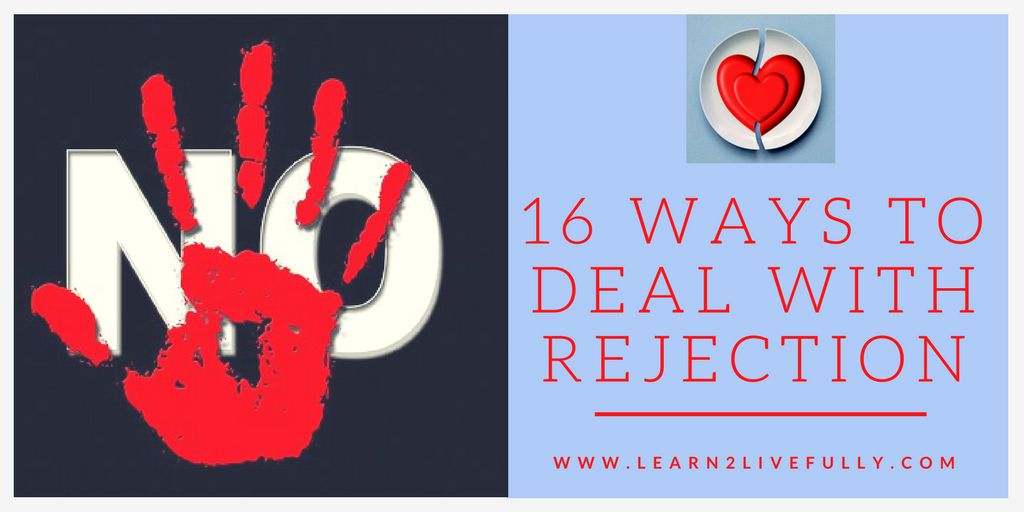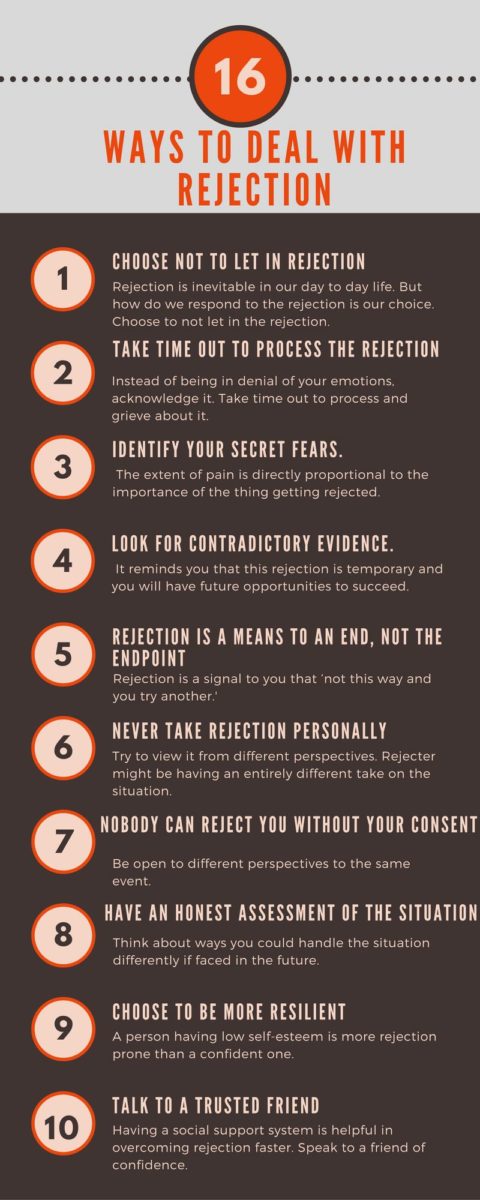Rejection:16 Proven Ways To Deal With it

Rejection is part of our life. Nobody can get rid of rejection entirely. I will discuss different ways to deal with rejection in Today’s post.
Rejection is an inevitable slice of our life.
If you look at the life of most successful people, you could see that they have faced fierce failures before they reach success. Fear of rejection is one of the primary reasons why many of us fail to achieve our goals. Fear of rejection is the fear that others will not recognize us as the way we want and that they may treat us badly.
We prefer to avoid rejection as we want to be accepted and fit into the families and communities. Acceptance is a vital aspect for us to enjoy our life. Who does not love to be recognized and appreciated by people around? Families, companies, societies, and religions use rejection as a way to control the lives of members. The fear of losing relatives and friends keeps many people in line.
Rejection is an inescapable part of our life, regardless of how smart, intelligent or successful we are. There will be times when you get ‘No’ to your date request, your business proposal or an innovative idea. Your job interview may turn out to be a disastrous one and publishers may decline your book.
Have you noticed some people bounce back from defeat stronger than before, while others stop even trying again?
Let’s explore 16 ways to deal with rejection.
1. Choose not to let in rejection.
Rejection is inevitable in our day to day life. But how do we respond to the rejection is our choice. Choose to not let in the rejection.
According to celebrity hypnotherapist Marisa Peer, there are five simple yet effective ways to respond to any dismissive comments and criticism, which you can apply in your everyday life.
She suggests reacting to the criticizer using the below five techniques.
1. “Thank you for sharing that.”
When somebody gives a negative feedback like your dress is awful, just say “Thank you for sharing that.” With this response, you are acknowledging the negative feedback as his/her opinion, and you are not letting it in.
2. “Would you share that again, I missed that?”
For Deeper Rejections, she suggests responding with “Would you share that again, I missed that?” If he/she repeats, try the third technique.
3. “Are You Trying to make me feel bad about myself?”
Ask him/her “Are You Trying to make me feel bad about myself?” If the response is something like “I am helping you to improve.” You can take that as a feedback to improve yourself. In case if his/her response is harsh, you can try the fourth technique.
4. “You can think what you want, I’m not going to let that in.”
If someone says to you “Yes I want you to feel terrible, I hate you!” Reply to him /her that “You can think what you want, I’m not going to let that in.”
5. “Did you know that critical people have most criticism reserved for themselves?”
The fifth technique is letting them know critical people have most criticism reserved for themselves. You are not letting that in.
Here is the link to the video five techniques to deal with Rejection by Marisa Peer.
2. Take time out to process the rejection
It is natural for you to feel disappointed, immediately after being turned down whether it is a job interview failure or a dismissal of your idea by your boss or a bad presentation at work. Instead of being in denial of your emotions, acknowledge it. Take time out to process and grieve about it. Ensure you do not take days to mourn about it. It is healthy to take some time out to let go of your emotions.
But being in the state of rejection for a long time is not going to help you. So keep your time break appropriate to the size of your setback. Never take any significant decisions in the state of disappointment.
If your boss scraps your idea and you feel abandoned, you can leave office early that day. Return the next day as fresh and energized as possible. After ending a love relationship, you may take a break from dating for a while to heal.
3. Identify your secret fears.
You typically do not feel disappointed about the things that you do not care. The extent of pain is directly proportional to the importance of the thing getting rejected.
A guy who believes to be handsome may not take a rejection on his looks deeply. You can dismiss the negative criticism quickly on your strengths. But you might over react or find it’s hard to overcome if the rejection hits right into your fears or weakness.
Identify your hidden fears, try to overcome them. I will discuss how to overcome our fears in coming days.
4. Look for contradictory evidence.
A company has declined you in a job interview. Instead of feeling failed, think about your previous successful job interview experiences. How good you performed in those interviews!
Looking for contradictory evidence helps you feel better. It reminds you that this setback is temporary and you will have future opportunities to succeed.
5. Rejection is a means to an End, not the endpoint
Look at rejection as a means to an End, not the endpoint. When you get a refusal, it is an indication to you that ‘not this way and you try another.’ This gives you more clarity as you can eliminate a path from your journey towards achieving your goal.
Being repeatedly denied a promotion even after your best efforts, time to look for a new job or a career?
6. Never take Rejection personally
Rejection is part of our life. Think about the times you rejected somebody’s offering. Why did you say ‘No’? It is because the offering did not work for you at that point. Rejection means rejecter’s requirements were not met at that particular time.
Never take Rejection personally. Try to view it from different perspectives. Rejecter might be having an entirely different take on the situation. Understanding the other perspectives helps you learn and grow from the setbacks.
7. Nobody can reject you without your consent
Nobody can reject you unless you allow yourself to be rejected. Be open to different perspectives to the same event. When you start to look at an event from different angles, you begin to build resilience.
Remember that life balances out itself with ups and downs- sometimes you win, sometimes you lose.
8. Have an honest assessment of the situation
Assess the situation from all the possible perspectives. Think about ways you could handle the situation differently if faced in the future. What will you do the same in the future? What are your learnings from it?
9. Choose to be more resilient
A person having low self-esteem is more rejection prone than a confident one. Build your resilience muscles, so that you can bounce back quickly when rejection occurs. Individuals who do not feel good enough, take setbacks seriously and relive it over and over. They find it difficult to go ahead in life after a failure.
10. Talk to a trusted friend
Having a social support system is helpful in overcoming rejection faster. Speak to a friend of confidence. Keep in mind while talking about the incident, you are not indulging in ‘digging the groove deeper.’
One approach to identifying this is to notice how you are feeling after talking about the problem. Are you feeling relieved or feeling the same or worse. If you feel better after sharing the rejection, it is a healthy kind of sharing. If not, you might be talking about the pain, involved with questions more of why did this happen to me.
11. Rejection an indication that you are living life to the fullest
Are you not facing any difficulty? Then the chances are high that you are playing it safe; being in your comfort zone always. When you take risks and push your limits, you will face setbacks. Rejection is a signal that you are expanding in your life.
12. Rejection a wake-up call to improve yourselves
Consider failures as a chance for you to transcend your limitations. It is an opportunity to expand your range of possibilities. Successful people bounce back from failures quickly and try again with new strategies. Sometimes you need to change your goal.
Being rejected for a promotion or not progressing in a career even after your sincere efforts. Think about a job change or a career switch.
13. Take care of yourself
Understand yourself. Having a good self-care routine helps you to be more rejection capable. When you exercise regularly, you are not only taking care of your physical state also your mental and emotional state.
Building a strong social support system and managing your finances are part of your self-care. When you are happy, your response to a rejection is far better than otherwise. Give importance to yourself first.
14. Keep a success journal
Have a success journal. Read it whenever you need a boost. Success journal is a fantastic tool to shift you out of negative feelings. When I say, the success it need not be any significant achievement.
You can jot down anything that makes you feel happy. It could be a goal achievement or appreciation from your boss, a Thank you note from your client, a compliment from a colleague.
Let your success journal grows week by week, as you accumulate small or big successes. You will feel better to read the nice things others have talked about you and notice the kind of progress you achieved.
15. Prepare yourself
Preparedness can reduce the possibility of rejection. Do a realistic assessment of where you are, what your strengths are, what are the risks involved. Prepare yourself for the worst possible outcome. How bad the worst possible outcome would be.
Think about the best possible outcome.
16. Desensitize the pain of rejection
By avoiding situations that are potentially harmful to your ego and confidence, you are not protecting yourself. Put yourself into situations where you know you will get rejected. Go for a job interview; knowingly you will get rejected.
By getting repeated exposure to rejection, your emotional response also reduces. Gradually you turn to be in a state of Rejection Proof.
You can watch Jia Jang’s TED Talk on his 100 days of Rejection. In this TED Talk, Jia Jang explains about his social experiment on Rejection.
When you’re afraid of rejection, you lose your self-esteem, your passion, yourself. Only by overcoming your fear of rejection can you fully express the unique genius of who you are. When you no longer fear rejection, you can ask for more from your life. Take the time to deal with rejection and make your life rejection proof.







Comments
Some worthwhile advice. Good job.
All are great points! 7 resonates with me deeply. New sue it is the absolute truth.
Yes! I completely agree with you on all the pointers, especially the one that says- nobody can reject you without your consent. You give the permission to someone to like or dislike you.
Self-care & self-love definitely help to deal with rejection.
Good advice to reflect on 🙂
Coming from a background in theatre, these tips are so important. I should have read this years ago.
I really do think most people take rejection too seriously and much too personally. These are great strategies to deal with the frustration and move forward. Thanks.
The biggest part of job hunting is receiving a lot of rejection. It’s very disheartening being told that you are “not qualified” when you know your resume shows more than enough qualification. I always end up taking it personally.
Very informative and useful post all are great points. Thanks for sharing.
Rejection really is part of life, and we must learn to deal with it. Your tips are great – very helpful. I think just about any profession or any person on an individual level needs to learn to deal. Now, if I can figure out how to deal with hurtful family members that would be great! lol
Yes!!!! I think the most important thing is to remember it to take it personally! Most of the time it’s not that you suck, it’s that your idea or plan just doesn’t fit!
Rejection is something we all have to deal with in life so thank you for this post! I like the idea of not letting rejection in!
An excellent article. Rejection is just another negative thing we have to deal with .Having a self care routine for it seems an awesome idea.Superb.